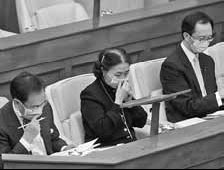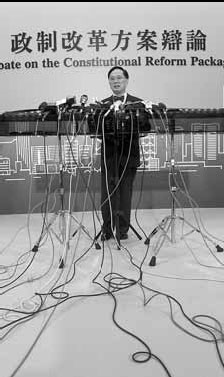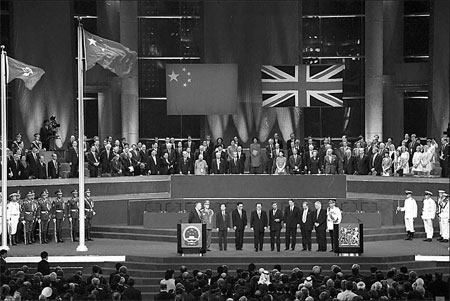Events that shaped the vibrant city
Updated: 2012-07-01 08:08
(China Daily)
|
|||||||
|
Ceremony held for the return of Hong Kong to the motherland from British rule on July 1, 1997. Provided to China Daily |
The principle of "One Country, Two Systems" and "Hong Kong people governing Hong Kong" with a high degree of autonomy has continued to be successfully implemented since Hong Kong's historic return to the motherland in 1997. As the HKSAR begins a new phase in its history, here are some of the major events in the past one-and-a-half decades.
Visits of top leaders
In 1997, then president Jiang Zemin and then premier Li Peng led a high-level delegation to Hong Kong to attend ceremonies marking the return and the establishment of the Hong Kong Special Administrative Region. It was the first visit to the city by a top State leader. Premier Wen Jiabao visited in June 2003 during the SARS epidemic and toured Amoy Gardens one of the worst-hit areas.
President Hu Jintao visited Hong Kong in 2007 for the 10th anniversary celebrations and met people from all walks of life. He was followed in 2008 by Vice-President Xi Jinping, who inspected Hong Kong's facilities for the staging of the Beijing Olympics equestrian events.
Last year, Vice-Premier Li Keqiang visited Hong Kong to attend an economic forum on the 12th Five-Year Plan (2011-15) and announced 36 incentives to support the city's economic development.
NPC Basic Law
There have been four interpretations of the Basic Law made by the National People's Congress Standing Committee since 1997 to offset potential constitutional crises.
The first was in 1999 when the committee ruled in the Ng Ka-ling case that children of Hong Kong residents born on the mainland would not be granted the right of abode in the HKSAR if either of the parents was not a Hong Kong permanent resident at the time of their birth. Three other interpretations followed in 2004, 2005 and 2008.
A foreign domestic helper, who had lived in Hong Kong for seven years, sought a judicial review this year of a High Court decision denying her the right of abode. The Court of Appeal upheld the lower court's ruling, saying it was not unconstitutional.
Stronger governance
The HKSAR government has undergone four major restructuring processes in the past 15 years to better utilize manpower and resources and strengthen governance.
In 2002, then chief executive Tung Chee-hwa introduced the political accountability system and reduced the number of political bureaus from 16 to 11.
In 2007, outgoing Chief Executive Donald Tsang Yam-kuen added the Labour and Welfare Bureau and appointed assistant bureau chiefs and political assistants to get a "better pulse" of the people.
Incoming Chief Executive Leung Chun-ying has proposed streamlining the political structure with three secretaries, two deputies and 14 bureaus and aligning the functions of various bureaus.
Civil service pay cuts

The government proposed pay cuts for civil servants in 2002 and 2003 to be in line with the economic trend and strengthen responsibility to the government and the public. The proposals triggered legal action from civil servants that dragged on for three years. The Court of Final Appeal ultimately ruled that the cuts were not against the Basic Law.
Epidemics hit HK
Hong Kong was hit by the world's first outbreak of bird flu in 1997, in which six people died. It was followed by the 2003 SARS epidemic which killed nearly 300 people and brought economic and social life to a standstill. In 2009, the first cluster of swine flu was reported, forcing all primary schools to be shut for two weeks as the authorities battled to bring it under control.
Article 23
The Hong Kong government's proposal to legislate an anti-subversion law under Article 23 of the Basic Law in 2002 was shelved after it failed to get the necessary support from lawmakers.
International feats
Hong Kong hosted the World Trade Organization's sixth ministerial conference in 2005, followed by the Beijing Olympics equestrian events in 2008 and the East Asian Games a year later.
In 2006, former director of health Margaret Chan Fung Fu-chun made history by becoming the first Hong Kong official to be elected as director-general of the World Health Organization.
Minimum wage legislation
Minimum wage legislation was enacted in May 2011, providing for HK$28 ($3.6) an hour and setting a milestone in the protection of labor rights for grassroots workers.
Infrastructure
Major infrastructure projects completed since 1997 started with the new international airport at Chek Lap Kok, which opened in 1998. In 2001, the government decided to invest HK$600 billion in about 1,000 infrastructure and railway network expansion projects, which are to be completed in the next 15 years.
Hong Kong Disneyland began operations in 2005.
Markets' ups and downs
Hong Kong's stock and property markets had a wild ride. Following a four-year ascent from the Asia financial crisis in 1997, the Hang Seng Index plunged from a record high of 32,000 points to below 11,000 in late 2008 after the onset of the US financial crisis. The property market lost 30 percent of its value.
In 2010, the Hang Seng Index rebounded to 25,000 points, while property prices climbed back to levels above those that preceded the 1997 Asian financial crisis. The incoming government has pledged to increase land supply to stabilize the property market.
Educational reform
"Mother tongue" education was introduced in 1998, with most non-Chinese language schools switching from English to Chinese.
In 2009, the "3-3-4" system was adopted for secondary schools, providing for three years of junior secondary, three years of senior secondary and four years of university education.
Moral, civic and national education will be made mandatory at all primary and secondary schools from the 2013-2014 academic year.
Universal suffrage
Hong Kong's chief executive will be elected by universal suffrage in 2017, and all Legislative Council members will be directly elected by 2020. The government also decided in 2012 to increase the number of members of the Election Committee selecting the chief executive from 800 to 1,200 and to raise the number of legislative seats to 70 as part of the democratic development process.

(China Daily 07/01/2012 page11)
